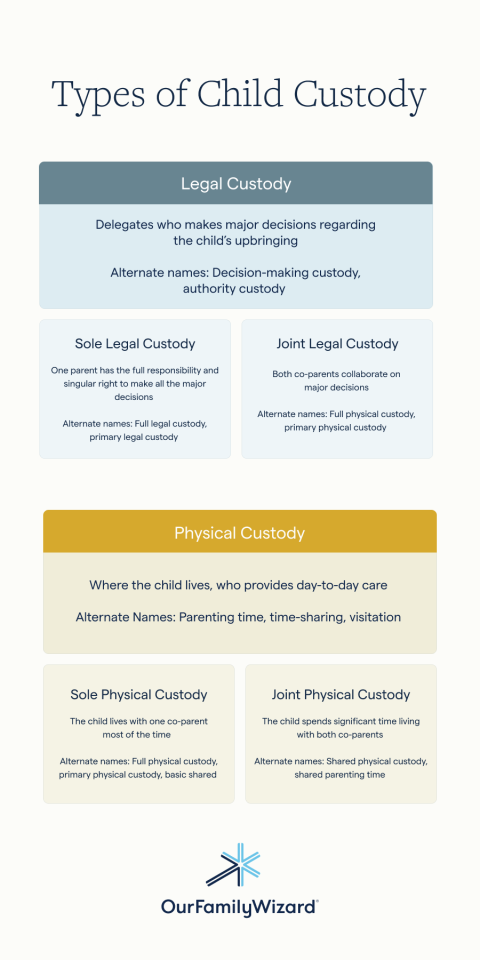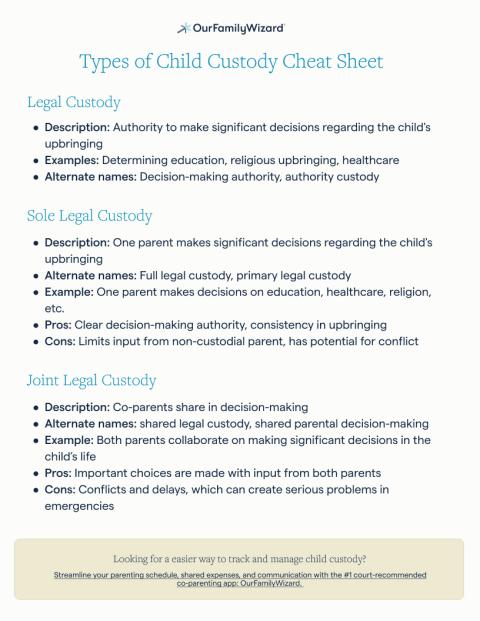Child Custody Types: Pros, Cons, Examples, & Resources
Child custody sets the foundation for co-parenting. This article explores the different types of custody, and it weighs the pros and cons of common custody scenarios. Get expert insights and practical resources for divorced and separated co-parents, including a cheat sheet of child custody types.
Different child custody types
There are different types of custody, which impact how you and your co-parent will share parenting time and decision making for your children after divorce or separation. The major types include physical, legal, sole, and joint custody. The best options depend on your family’s circumstances and your child's needs. 
Helen M. O’Shaughnessy, a North Carolina Board-Certified Specialist in Family Law, describes custody this way: “Custody arrangements encompass two important parts of co-parenting. First, physical custody describes where the child will live and who will manage the day-to-day care. Then, legal custody describes who will make major decisions about their upbringing.”
O’Shaughnessy says two essential custody types are sole custody and joint custody which can relate to either legal or physical custody. Those terms describe whether co-parents share legal and/or physical custody responsibilities. Generally, in sole legal and physical custody, one parent has all the rights and responsibilities. In joint legal and physical custody situations, parents share rights and duties for parenting.
Before diving into the specifics, it's important to note that different jurisdictions may use different terminology for physical and legal custody, as well as for sole and joint custody. 
Lyne Ranson emphasizes this point. She is an experienced family law attorney who will become Chair of the American Bar Association (ABA) Family Law section in August 2024. Lyne is a fellow in the AAML American Academy of Matrimonial Lawyers.
“Jurisdictions across the country may use different terms to refer to custody arrangements,” explains Ranson. “Regardless of the terminology, all jurisdictions address two prongs of custody: Where the child will live with a specific time schedule and how the co-parents will make major decisions related to the child’s upbringing.”
Key Takeaways
- Physical custody describes where a child lives, while legal custody describes who will make major decisions about the child’s upbringing.
- Sole custody and joint custody, which can pertain to physical or legal custody, note whether the co-parents will share custody or one co-parent will have sole responsibility.
- Custody arrangements are often nuanced, with co-parents sharing responsibilities to varying degrees—and it’s not always distinctly divided.
- Experts in different jurisdictions use various terms to describe custody types, such as primary parenting, shared parenting, decision-making, visitation, and more.
- To choose the best custody arrangement, it’s important to weigh the child's needs, your co-parenting dynamics, and practical considerations.
Sole custody vs. joint custody
In joint custody arrangements, co-parents share responsibilities and legal rights. Sole custody assigns all responsibilities and rights to one co-parent. Joint custody may involve sharing legal custody, physical custody, or both. Typically, a co-parent with sole physical custody also has sole legal custody, but not always.
Here's an overview of sole custody and joint custody:
- Sole custody
In sole custody, one parent has all the responsibilities for certain parenting aspects. The parent with custody is the custodial parent.
Alternate names: Other terms for sole custody include full custody and primary custody.
- Joint custody
In joint custody arrangements, the co-parents share the responsibilities and rights of parenting. Another term for this is shared custody. Co-parents can have joint legal custody, joint physical custody, or both.
“The terms 'joint' and 'sole' custody can seem limiting to many people," O'Shaughnessy says. "It may imply that one co-parent is doing all the work, or that both co-parents are sharing responsibilities equally. In practice, co-parenting and custody arrangements are much more nuanced than that. That's why we often use the language 'shared’ custody when negotiating with parents. Still, in our jurisdiction, the technical terms often remain ‘joint’ and ‘sole.’ ”
Alternate names: Other terms to describe some types of joint custody include shared custody, basic shared custody, and extended shared custody.

Legal custody vs. physical custody
Legal custody describes who has decision-making authority for a child’s upbringing. Physical custody defines where the child lives and who provides day-to-day care. Legal custody can affect physical custody but does have a different meaning.
“The allocation of physical custody will, to some extent, influence legal custody,” Ranson says. “In West Virginia, for instance, the individual with the most time-sharing assumes the role of legal residential custodian. Conversely, if a co-parent only has one overnight a week, their legal custody may be limited.”
Here's an overview of legal custody vs. physical custody.
Legal custody types, examples, and pros-cons
Legal custody gives a co-parent the right to make significant decisions regarding the child’s upbringing. These decisions could be related to education, health care, religion, and other important issues.
Other terms for legal custody include decision-making authority and authority custody.
There are two types of legal custody: sole legal custody and joint legal custody. Here are examples and the pros and cons of each type.
- Sole legal custody
Only one co-parent has decision-making authority, which means they have exclusive power over these and other types of decisions.
Pros
It can be easier to make important decisions quickly.
It can be appropriate in situations where the noncustodial co-parent has a history of serious issues that affect their co-parenting.
Cons
It puts the burden entirely on one co-parent, which can be overwhelming. It can also be upsetting for the parent who gets no input into major decisions. - Joint legal custody
Co-parents share the responsibilities and rights to make major decisions on their child’s behalf. Joint or shared legal custody doesn’t always look the same in every co-parenting dynamic.
Some co-parents who exercise joint legal custody collaborate on every major decision to reach a mutual agreement. In other examples, one co-parent has authority over one specific domain.
"For instance, imagine a scenario where one -parent is a doctor," Ranson explains. "Often, the court may delegate decision-making power regarding medical matters to that individual. However, specialized expertise is not always a prerequisite for sole authority over a specific domain. The non-medical parent may be the one most involved in the child’s specific medical treatment and knowledgeable on that issue. Sometimes, the dynamics of co-parenting history naturally allocate decision-making power to one parent.”
O'Shaughnessy echoes that sentiment. “Previous experiences can set a precedent for the court's deliberations. For instance, if one co-parent has a history of wavering on health-related issues, the court may lean toward granting the other co-parent full authority over medical decisions. However, this doesn't negate the other co-parent's authority in other areas, such as education. Ultimately, the allocation of authority depends on the specifics of each situation."
Pros
Both co-parents contribute to major decisions, ensuring that important choices are made with input from both parties.
Cons
There can be conflicts and delays if both co-parents can’t agree promptly.
The stakes are even higher in emergencies.
Physical custody types, examples, and pros-cons
Physical custody determines where the child lives on a day-to-day basis and who is responsible for their direct supervision and care. It involves time-sharing or parenting agreements that set out specific schedules.
Physical custody also affects financial issues like child support and tax exemptions. “Whoever has the most overnights that year can claim the child on his/her tax forms and the number of overnights is a huge factor in calculation of child support,” explains Ranson.
Alternate terms for physical custody include parenting time, time-sharing, and visitation.
There are two types of physical custody: sole physical custody and joint physical custody. Here are examples and the pros and cons of each type.
- Sole physical custody
In this arrangement, one parent has physical custody of the child. However, that often means the child resides primarily with that parent, not solely.
In fact, it usually means that parents exercise a schedule like 70/30 or 80/20 instead of more even splits like 60/40 or 50/50.
“In our jurisdiction, we designate one co-parent as the primary physical custodian if the other co-parent has fewer than 127 overnights," clarifies Ranson. "This arrangement is often referred to as 'basic' or 'nominal' shared custody. In this case, both co-parents have parenting time with the child; but the custodial co-parent has a substantial majority of overnights.”
In this sense, alternate names for sole physical custody include basic shared custody, primary custody, and nominal shared custody.
However, O'Shaughnessy notes that the term “sole physical custody” is uncommon in her jurisdiction. "When I think of true 'sole' physical custody, I imagine a situation where one parent is entirely uninvolved in the child's life," she explains. "In most instances, co-parents are still sharing physical custody, even if the court designates one as the primary physical custodian. Ultimately, sometimes these terms are merely semantics and cannot fully capture the diversity of co-parenting experiences."
Pros
Sole physical custody can provide stability and consistency for the child by establishing a primary residence.
It can also be suitable when the noncustodial parent cannot provide a stable or secure living environment or lives far away from the child.
Cons
Sole physical custody limits the child’s time with the noncustodial parent, which can negatively impact their relationship and bonding.
It places most caregiving responsibilities on one parent, which can be challenging. - Joint physical custody
In this type of custody, the child spends considerable time in each parent's home, and both co-parents contribute to the child’s day-to-day care. Ideally, the parents collaborate to create a parenting schedule that accommodates the child’s needs and ensures that both co-parents share parenting time equitably.
There is a growing consensus among family experts that regular and frequent contact with both parents, especially in early childhood, benefits the child's well-being. Consequently, some states view a 50/50 custody split as the default, unless compelling reasons point to a different solution.
"West Virginia recently implemented a law that presumes that 50/50 custody is in the child’s best interest,” notes Ranson. "Parents opposing this schedule must present strong evidence why it's impractical or not in the child’s best interest. For instance, geographical distance, the parent’s work schedule or medical limitations might hinder one parent's participation. Additionally, courts may deem a parent unfit for equal custody due to past abuse or other serious concerns."
Another term for joint physical custody is extended shared custody.
Pros
Joint physical custody allows the child to maintain strong bonds with each parent.
It ensures regular contact between the child and both parents.
Cons
Joint physical custody requires that both co-parents effectively communicate and cooperate to coordinate schedules and pick-ups/drop-offs.
It involves logistical challenges like transportation between homes and coordinating school and extracurricular activities.
It’s only practical for co-parents who live close together.

Third-party custody arrangements
Third-party custody means someone other than the child’s legal parent assumes legal and physical custody. This person is usually a grandparent or other relative. Often, they’ve provided significant emotional or financial support in the past.
“There is a concept known as ‘psychological parent in our state,’” Ranson says. “This person stands in the stead of the child’s legal parent, whether biological or adopted, and has provided significant care and support for the child historically.”
Ranson gives this example: “In one case, one parent tragically died in a car accident when the child was six months old. Unfortunately, the other parent was not involved in the child’s life in any way up to that point. A grandmother stepped in to raise the child until he was five years old and was eventually awarded psychological parental custody.”
How is child custody determined?
To determine child custody, the courts prioritize the child's best interests. They consider factors like each co-parent's willingness and ability to care for the child. The specific process depends on the jurisdiction and the circumstances. Judges also strongly consider any agreements the co-parents made outside of court.
“The standard for child custody is always the child’s best interest in most states,” explains O'Shaughnessy. “Beyond that, the approach varies based on the jurisdiction.”
Broadly speaking, there are two main avenues for determining child custody. First, co-parents can reach an agreement with the assistance of a mediator or attorney. They can settle on a custody plan outside of court.
"When co-parents reach agreement, they can formalize it in a separation agreement, akin to a contract," O'Shaughnessy says. "These agreements lack the legal weight of court orders and may pose enforcement challenges if one co-parent believes the other is in breach. Co-parents can also choose to proceed with a lawsuit and proceed to a hearing or enter a consent order (court ordered agreement). This provides a mechanism for recourse, such as filing for contempt if necessary."
Alternatively, if the co-parents can’t agree, they must attend a court hearing where each parent (or their attorney) presents their case for what they believe is best for the child. The court then decides based on the evidence and the child's best interests.
"Ultimately, the overarching goal of the process is to prioritize the child's best interests and foster an ongoing relationship with both co-parents, wherever possible,” O'Shaughnessy says.
Choosing the right type of custody
Consider the key factors when choosing the right type of custody. Experts recommend that you first familiarize yourself with the types of custody. Then, assess your child’s needs, your co-parenting relationship, and your practical concerns.
To choose the right type of custody, consider these factors:
- Assess your child’s needs
"Custody arrangements should always revolve around meeting the child's needs and serving his/her best interests," emphasizes Ranson. "It's crucial to consider factors such as the child's age, developmental stage, and individual requirements. For instance, co-parents with a very young child might choose a 2-2-3 [days] schedule that minimizes the child’s time apart from either co-parent.”
- Consider your co-parenting dynamic
The level of conflict in your co-parenting relationship will strongly influence which type of custody is best. Both co-parents should consider whether they can work together, communicate well, and cooperate. Working with a mediator or parenting coordinator can help co-parents honestly assess their relationship.
- Consider the logistics
This includes practical considerations like work schedules, living arrangements, the distance between homes, and the child’s extracurricular activities. Co-parents need to determine how different custody arrangements would impact these factors. For example, two co-parents who live far apart may want shared physical custody, but the practical logistics of traveling often and for a long time could make it unsustainable.
- Check the financial and legal implications
Different custody arrangements have different financial and legal implications. “Child support is the big one,” O'Shaughnessy says. “If you are a noncustodial co-parent with less than a certain number of overnights, your child support obligations may increase, and you may not be able to claim the child on taxes.”
Understanding different custody types is crucial for co-parents navigating post-divorce or post-separation arrangements.
Resources for co-parents navigating custody arrangements
Custody arrangements can be overwhelming for any co-parent. Fortunately, there are helpful resources that explain how to create a parenting plan, manage a custody schedule, organize important documents, and more.
Custody arrangements will significantly affect both co-parents’ lives and their child’s upbringing. It's crucial to approach these decisions thoughtfully.
Here’s a list of resources that help co-parents navigate specific areas of custody arrangements.
- Creating a parenting plan
A parenting plan lays the foundation for co-parenting after separation or divorce. Resources and templates give co-parents a step-by-step guide to creating a comprehensive parenting plan that addresses their family’s unique needs. Experts can also offer their parenting plan tips and tricks to support co-parents as they go through the process. - Creating a custody schedule
Establishing a custody schedule is essential for providing structure and stability for children. Co-parents can find resources and tools to assist them in creating custody schedules that balance the child's time between both parents. To map out how different parenting plans might look, check out 50/50 custody schedule templates, 60/40 schedule templates, and 70/30 schedule templates. - Organizing custody documentation
Documentation is essential for transparency and accountability. This article explains why co-parenting documentation is crucial and how to do it. - Keeping a custody journal
Maintaining a custody journal can be beneficial for documenting communication, interactions, and important events related to custody arrangements. Here’s a custody journal resource. - Local, in-person support and community
Alongside these online resources, most areas have parenting classes, legal aid services, and support groups. To find one in your area, check out directories of child custody resources by region. You can also check your local family court or family services department. You can also look for local support groups through community centers or social media platforms by searching for terms like “co-parenting support group.”
Best co-parenting app for child custody
OurFamilyWizard's co-parenting app is the ultimate resource for co-parents to manage child custody. After you establish your parenting time schedule, the shared Calendar helps you both follow it reliably. The app’s Messaging and Journal features help you stay connected about parenting decisions, both big and small.
Designed by co-parenting experts, OurFamilyWizard is the leading co-parenting app. The shared Calendar empowers you to track and manage your physical custody (where the child will be and when). It even has tools for swapping days and requesting changes (without sending an open-ended message!).
OurFamilyWizard covers all co-parenting communication, whether it's discussing major decisions, sharing costs, changing the schedule, calling your child, or simply sharing a photo or memory. The Journal feature even lets you confirm your arrivals at exchange locations, so you can maintain a transparent history of reliability and trust. The app facilitates communication between co-parents and offers a single source of truth by documenting everything.



